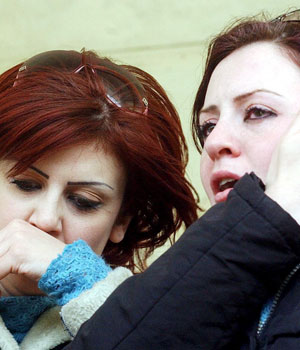
Two Syrian university students from the Israeli-occupied Golan Heights cry as they say happy Mother’s Day to their mothers on the other side of the frontier still under Israeli occupation (EPA)
BEIRUT,(Reuters) – Rival Lebanese leaders began a third round of talks on Wednesday but an agreement to end Lebanon’s worst political crisis in 16 years appeared out of reach for now, political sources said.
They said the current round of talks would not yield breakthroughs on the two main issues: the fate of pro-Syrian President Emile Lahoud and the disarming of the anti-Israeli Hizbollah guerrilla group.
“The gaps in the positions of participants are widening, not narrowing,” one senior source said. “There are no quick fixes and the dialogue looks set to linger on without results.”
The talks are expected to be adjourned until after an Arab summit in Sudan next week. The political sources said Lebanon would figure prominently at the summit with behind the scenes efforts by heavyweights Saudi Arabia and Egypt to ease tensions between Beirut and Damascus.
The consent of Syria, the dominant force in Lebanon for three decades until it withdrew its forces last year, is widely seen as essential if its close ally Lahoud is to step down or be removed.
Pro- and anti-Syrian Lebanese politicians first met at the “national dialogue” talks in early March to solve the country’s worst crisis since the 1975-1990 civil war.
The talks resumed a day after U.N. Secretary-General Kofi Annan said he would begin talks with Beirut on creating a special court to try suspects in the murder last year of former Lebanese Prime Minister Rafik al-Hariri.
The politicians agreed last week on seeking diplomatic ties with Syria, disarming Palestinian fighters outside refugee camps within six months and asking the United Nations to declare an Israeli-occupied strip on the border as part of Lebanon.
But they deferred to this week discussing demands by anti-Syrian leaders to remove Lahoud from power and a U.N. Security Council resolution demanding Hizbollah disarms.
Lahoud, who is not at the talks, said on Saturday he would not cave in to mounting pressure to resign and that the Hizbollah guerrillas should keep their arms.
Hizbollah officials have also said in recent days the president should complete his term, which ends in November 2007, and that the talks should focus on how to defend Lebanon against Israel rather than solely on the group’s weapons.
“We are convinced the president should complete his term and the problem is not the presidency but the way (the government) is running the country,” Hizbollah deputy chief Sheikh Naim Qassem said on Tuesday.
Many Lebanese see Lahoud as the last vestige of Syrian tutelage over their country, but removing the president is very difficult constitutionally unless he resigns.
Some Lebanese say it is time Hizbollah, whose guerrilla attacks were crucial in ending the 22-year Israeli occupation of south Lebanon in 2000, laid down its arms and stuck to politics.
Hizbollah has vowed to keep its arms as a deterrent against Israel and until the Shebaa Farms, a strip on the border between Lebanon, Israel and Syria’s Golan Heights, is liberated.
The United Nations considers Shebaa Farms Syrian soil seized by Israel in the 1967 Middle East war but Lebanon considers it still-occupied Lebanese land.

A Syrian student at Ain al-Tineh village on the Syrian side of the Golan Heights cries when she hears her mother’s voice from Majdal Shams village in the Israeli-occupied parts on Mother’s Day (REUTERS)

Syrian students wave national flags as they gather in the fields on the Syrian side of the Golan Heights to wish their mothers in the Israeli-occupied Druze village of Majdal Shams (background) a happy Mother’s Day, 21 March 2006 (AFP)
